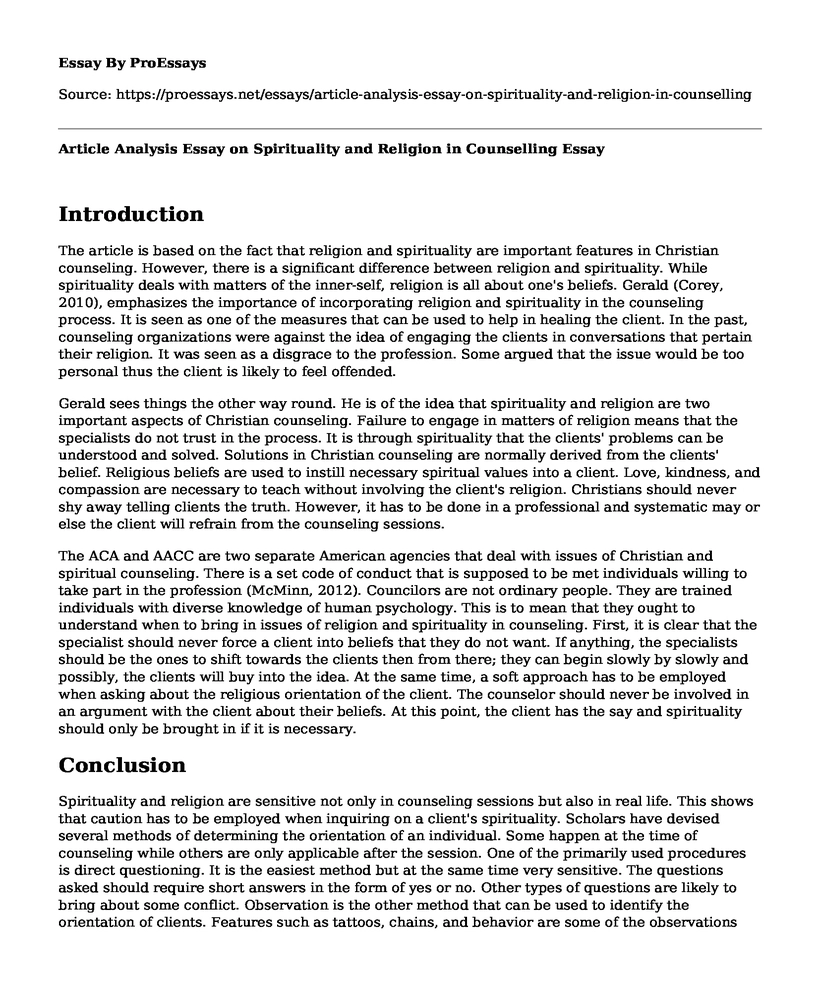Introduction
The article is based on the fact that religion and spirituality are important features in Christian counseling. However, there is a significant difference between religion and spirituality. While spirituality deals with matters of the inner-self, religion is all about one's beliefs. Gerald (Corey, 2010), emphasizes the importance of incorporating religion and spirituality in the counseling process. It is seen as one of the measures that can be used to help in healing the client. In the past, counseling organizations were against the idea of engaging the clients in conversations that pertain their religion. It was seen as a disgrace to the profession. Some argued that the issue would be too personal thus the client is likely to feel offended.
Gerald sees things the other way round. He is of the idea that spirituality and religion are two important aspects of Christian counseling. Failure to engage in matters of religion means that the specialists do not trust in the process. It is through spirituality that the clients' problems can be understood and solved. Solutions in Christian counseling are normally derived from the clients' belief. Religious beliefs are used to instill necessary spiritual values into a client. Love, kindness, and compassion are necessary to teach without involving the client's religion. Christians should never shy away telling clients the truth. However, it has to be done in a professional and systematic may or else the client will refrain from the counseling sessions.
The ACA and AACC are two separate American agencies that deal with issues of Christian and spiritual counseling. There is a set code of conduct that is supposed to be met individuals willing to take part in the profession (McMinn, 2012). Councilors are not ordinary people. They are trained individuals with diverse knowledge of human psychology. This is to mean that they ought to understand when to bring in issues of religion and spirituality in counseling. First, it is clear that the specialist should never force a client into beliefs that they do not want. If anything, the specialists should be the ones to shift towards the clients then from there; they can begin slowly by slowly and possibly, the clients will buy into the idea. At the same time, a soft approach has to be employed when asking about the religious orientation of the client. The counselor should never be involved in an argument with the client about their beliefs. At this point, the client has the say and spirituality should only be brought in if it is necessary.
Conclusion
Spirituality and religion are sensitive not only in counseling sessions but also in real life. This shows that caution has to be employed when inquiring on a client's spirituality. Scholars have devised several methods of determining the orientation of an individual. Some happen at the time of counseling while others are only applicable after the session. One of the primarily used procedures is direct questioning. It is the easiest method but at the same time very sensitive. The questions asked should require short answers in the form of yes or no. Other types of questions are likely to bring about some conflict. Observation is the other method that can be used to identify the orientation of clients. Features such as tattoos, chains, and behavior are some of the observations that are taken down and eventually help in the identification process. Regardless of the method used, moderation has to be paramount.
References
Corey, G. (2010). Integrating Spirituality in Counseling Practice. Retrieved from https://www.counseling.org/docs/default-source/vistas/integrating-spirituality-in-counseling-practice.pdf?sfvrsn=10
McMinn, M. R. (2012). Psychology, theology, and spirituality in Christian counseling. Tyndale House Publishers, Inc.
Cite this page
Article Analysis Essay on Spirituality and Religion in Counselling. (2022, Aug 15). Retrieved from https://proessays.net/essays/article-analysis-essay-on-spirituality-and-religion-in-counselling
If you are the original author of this essay and no longer wish to have it published on the ProEssays website, please click below to request its removal:
- Personal Essay Sample on Abstaining from Premarital Sex
- Essay on Effects of Social Media on Adolescents
- Analyze Thy Self Essay Example
- Old Testament Essay Example
- Research Paper on Schizophrenia: A Psychological Disorder
- Essay Example on Reuniting Christian Churches: Interpreting the Bible Metaphorically
- Paper Example on Psychiatric Assessment: Finding the Right Treatment Plan







